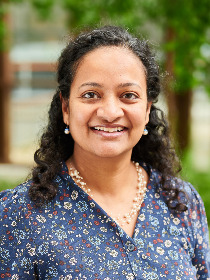R.K. (Ranjita) Bose, Prof

Research interests
Ranjita K. Bose was born in Kolkata (India) and obtained a bachelors in chemical engineering from Gujarat University (India) in 2006. She completed her Ph.D. in chemical vapor deposition of polymers in 2011 from Drexel University (USA). From 2012 to 2017 she did postdoctoral research on self-healing polymers in the Delft University of Technology (The Netherlands). In June 2017, she was appointed as an assistant professor at the University of Groningen (The Netherlands) and promoted to associate professor in June 2022. She is a passionate teacher and finds great satisfaction in supervising and mentoring her team of 7 PhD students, 1 postdoctoral researcher, and 4 MSc students. Her expertise is in polymer engineering, solvent-free processes, sustainable coatings and smart polymers. She has published 50+ peer-reviewed articles and holds 1 patent.
